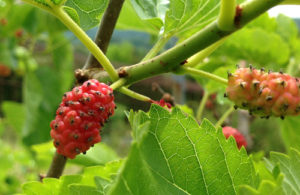Morus rubra, commonly known as the red mulberry, is a species of mulberry native to eastern and central North America. It is found from Ontario, Minnesota, and Vermontsouth to southern Florida, and west as far as southeastern South Dakota, Nebraska,Kansas, and central Texas. There have been reports of isolated populations (very likely naturalized) in New Mexico, Idaho, and British Columbia
Contents
Uses
The first English colonists to explore eastern Virginia in 1607 mentioned the abundance of both mulberry trees and their fruit, which was eaten, sometimes boiled, by the native Powhatan tribes.
Today, mulberries are eaten raw, used in fruit pastries, and fermented into wine.
The wood may be dried and used for smoking meats with a flavor that is mild and sweet.
Benefits
Digestive Health: Like the majority of fruits andvegetables, mulberries contain dietary fiber, approximately 10% of your daily requirements in a single serving, in fact. Dietary fiber can help to improve digestive health by bulking up stool, thereby speeding up the movement of food through the digestive tract, while also reducing occurrences of constipation, bloating, and cramping. Furthermore, fiber helps to regulate cholesterol levels and can boost heart health when regularly added to the diet.
Circulation: The high levels of iron contains in mulberries, which is a very unusual mineral for fruits to contain, can significantly boost the body’s production of red blood cells. This means that the body will increase its distribution of oxygen to important tissues and organ systems, thereby helping to boost metabolism and optimize functionality of those systems.
Blood Pressure and Heart Health: Resveratrol is a very important flavonoid antioxidant that directly affects the functioning of certain mechanisms in blood vessels, primarily making them less prone to damage by angiotensin, which can cause blood vessel constriction. In fact, resveratrol increases the production of nitric oxide, which is a vasodilator, meaning that it relaxes blood vessels and reduces chances of blood clot formation and subsequent heart issues like strokes or heart attacks. Resveratrol is found in many dark-skinned berries like mulberries, including most grapes, which is why this beneficial antioxidant is also found in many wines.
Cancer Prevention: Between the high content of anthocyanins, vitamin C, vitamin A, and various other polyphenolic and phytonutrient compounds, mulberries are absolutely packed with antioxidant potential. Antioxidants are the main line of defense against free radicals, which form as a dangerous byproduct of cellular metabolism and can damage healthy cells, causing them to mutate into cancerous cells. The diverse range of antioxidants found in mulberries means that they can neutralize these free radicals quickly, before too much damage is done.
Vision Health: One of the carotenoids found in mulberries is zea-xanthin, which has been connected directly to a reduction in oxidative stress on certain ocular cells, including the retina macula lutea. Furthermore, zea-xanthin functions as an antioxidant and prevents certain damage to the retina, including from free radicals that can cause macular degeneration and cataracts.
Immune System: Vitamin C is a powerful defensive weapon against any illnesses or foreign pathogens in the body that antioxidants don’t take care of. A single serving of mulberries is almost the entire requirement of vitamin C for the day, but combine that with the minerals andvitamins that are in this fruit, and you have a true weapon against illness. Add a few mulberries to your morning and watch your immune system health soar!
Cautions
Some mulberries are very good at lowering blood sugar levels, which is beneficial for some, but also very dangerous for others. Also, there are rare cases of allergies to mulberry, so use them in moderation and monitor your body’s reaction if eating them for the first time!
Interactions
None are recorded.
Other names
References
Source: OrganicFacts, http://www.organicfacts.net/health-benefits/fruit/mulberries.html
Wikipedia, https://en.wikipedia.org/wiki/Morus_rubra

